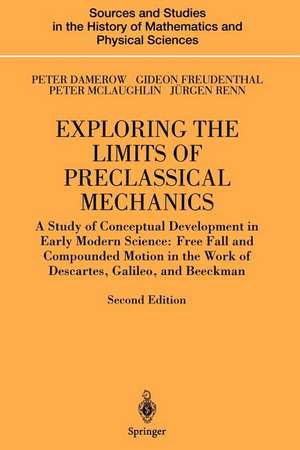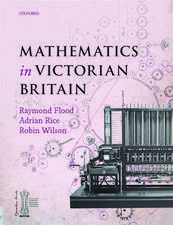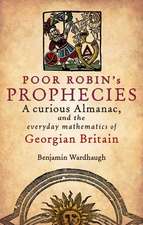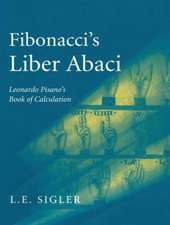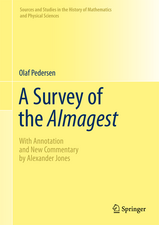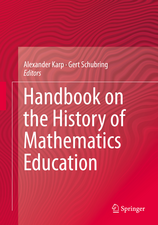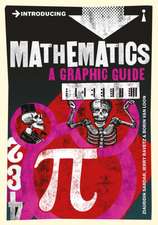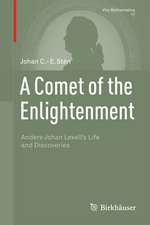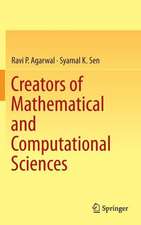Exploring the Limits of Preclassical Mechanics: A Study of Conceptual Development in Early Modern Science: Free Fall and Compounded Motion in the Work of Descartes, Galileo and Beeckman: Sources and Studies in the History of Mathematics and Physical Sciences
Autor Peter Damerow, Gideon Freudenthal, Peter McLaughlin, Jürgen Rennen Limba Engleză Paperback – 9 oct 2011
| Toate formatele și edițiile | Preț | Express |
|---|---|---|
| Paperback (1) | 896.70 lei 6-8 săpt. | |
| Springer – 9 oct 2011 | 896.70 lei 6-8 săpt. | |
| Hardback (1) | 900.80 lei 6-8 săpt. | |
| Springer – 30 mar 2004 | 900.80 lei 6-8 săpt. |
Din seria Sources and Studies in the History of Mathematics and Physical Sciences
- 20%
 Preț: 756.13 lei
Preț: 756.13 lei - 18%
 Preț: 907.11 lei
Preț: 907.11 lei - 15%
 Preț: 667.86 lei
Preț: 667.86 lei - 18%
 Preț: 1434.29 lei
Preț: 1434.29 lei -
 Preț: 387.75 lei
Preț: 387.75 lei - 15%
 Preț: 638.57 lei
Preț: 638.57 lei - 15%
 Preț: 643.65 lei
Preț: 643.65 lei - 18%
 Preț: 916.25 lei
Preț: 916.25 lei - 18%
 Preț: 1124.92 lei
Preț: 1124.92 lei - 18%
 Preț: 963.29 lei
Preț: 963.29 lei - 15%
 Preț: 652.31 lei
Preț: 652.31 lei - 18%
 Preț: 1244.89 lei
Preț: 1244.89 lei - 23%
 Preț: 686.57 lei
Preț: 686.57 lei - 15%
 Preț: 649.71 lei
Preț: 649.71 lei -
 Preț: 390.25 lei
Preț: 390.25 lei - 15%
 Preț: 644.18 lei
Preț: 644.18 lei - 15%
 Preț: 580.17 lei
Preț: 580.17 lei - 18%
 Preț: 1123.35 lei
Preț: 1123.35 lei - 15%
 Preț: 641.03 lei
Preț: 641.03 lei - 15%
 Preț: 581.14 lei
Preț: 581.14 lei - 18%
 Preț: 796.31 lei
Preț: 796.31 lei - 18%
 Preț: 2119.49 lei
Preț: 2119.49 lei - 24%
 Preț: 860.16 lei
Preț: 860.16 lei - 15%
 Preț: 645.14 lei
Preț: 645.14 lei -
 Preț: 384.48 lei
Preț: 384.48 lei - 18%
 Preț: 1410.63 lei
Preț: 1410.63 lei - 18%
 Preț: 969.28 lei
Preț: 969.28 lei - 15%
 Preț: 642.03 lei
Preț: 642.03 lei - 18%
 Preț: 1113.71 lei
Preț: 1113.71 lei - 15%
 Preț: 662.16 lei
Preț: 662.16 lei - 18%
 Preț: 963.29 lei
Preț: 963.29 lei - 15%
 Preț: 647.59 lei
Preț: 647.59 lei -
 Preț: 395.63 lei
Preț: 395.63 lei - 18%
 Preț: 941.50 lei
Preț: 941.50 lei - 15%
 Preț: 709.56 lei
Preț: 709.56 lei - 18%
 Preț: 901.26 lei
Preț: 901.26 lei - 15%
 Preț: 695.53 lei
Preț: 695.53 lei - 24%
 Preț: 1294.90 lei
Preț: 1294.90 lei
Preț: 896.70 lei
Preț vechi: 1093.53 lei
-18% Nou
Puncte Express: 1345
Preț estimativ în valută:
171.58€ • 179.63$ • 141.97£
171.58€ • 179.63$ • 141.97£
Carte tipărită la comandă
Livrare economică 05-19 aprilie
Preluare comenzi: 021 569.72.76
Specificații
ISBN-13: 9781441919175
ISBN-10: 1441919171
Pagini: 436
Ilustrații: XX, 414 p. 38 illus.
Dimensiuni: 155 x 235 x 23 mm
Greutate: 0.61 kg
Ediția:2nd ed. 2004. Softcover reprint of the original 2nd ed. 2004
Editura: Springer
Colecția Springer
Seria Sources and Studies in the History of Mathematics and Physical Sciences
Locul publicării:New York, NY, United States
ISBN-10: 1441919171
Pagini: 436
Ilustrații: XX, 414 p. 38 illus.
Dimensiuni: 155 x 235 x 23 mm
Greutate: 0.61 kg
Ediția:2nd ed. 2004. Softcover reprint of the original 2nd ed. 2004
Editura: Springer
Colecția Springer
Seria Sources and Studies in the History of Mathematics and Physical Sciences
Locul publicării:New York, NY, United States
Public țintă
ResearchCuprins
1: Concept and Inference: Descartes and Beeckman on the Fall of Bodies.- 2: Conservation and Contrariety: The Logical Foundations of Cartesian Physics.- 3: Proofs and Paradoxes: Free Fall and Projectile Motion in Galileo’s Physics.- 4. Epilogue.- 5. Documents.- Index locorum.
Textul de pe ultima copertă
The question of when and how the basic concepts that characterize modern science arose in Western Europe has long been central to the history of science. This book examines the transition from Renaissance engineering and philosophy of nature to classical mechanics oriented on the central concept of velocity. Descartes, Galileo, and other protagonists of what the authors call "preclassical mechanics" struggled with fundamental concepts and contributed crucial insights to classical mechanics, but it is not clear that they actually realized these insights themselves. This book argues that the emergence of classical mechanics was neither a cumulative change nor an abrupt revolution, but rather that the transformation was the result of exploring the limits and exhausting the possibilities of the existing, largely Aristotelian conceptual system.
In the dozen years that have passed since the appearance of the first edition, significant research has been done on Descartes and Galileo and the origins of modern science. There have also been important advances in the accessibility of sources and in technology for analyzing them. For this new edition, the authors take account of the most important new results. They include a new discussion of the doctrine of proportions, an analysis of the role of traditional statics in the construction of Descartes' impact rules, and go deeper into the debate between Descartes and Hobbes on the explanation of refraction. They also provide significant new material on the early development of Galileo's work on mechanics and the law of fall. All translations have been reviewed and revised for consistency of terminology and several new documents have been added. The bibliography has been updated to take account of new literature.
In the dozen years that have passed since the appearance of the first edition, significant research has been done on Descartes and Galileo and the origins of modern science. There have also been important advances in the accessibility of sources and in technology for analyzing them. For this new edition, the authors take account of the most important new results. They include a new discussion of the doctrine of proportions, an analysis of the role of traditional statics in the construction of Descartes' impact rules, and go deeper into the debate between Descartes and Hobbes on the explanation of refraction. They also provide significant new material on the early development of Galileo's work on mechanics and the law of fall. All translations have been reviewed and revised for consistency of terminology and several new documents have been added. The bibliography has been updated to take account of new literature.
Caracteristici
Includes supplementary material: sn.pub/extras
